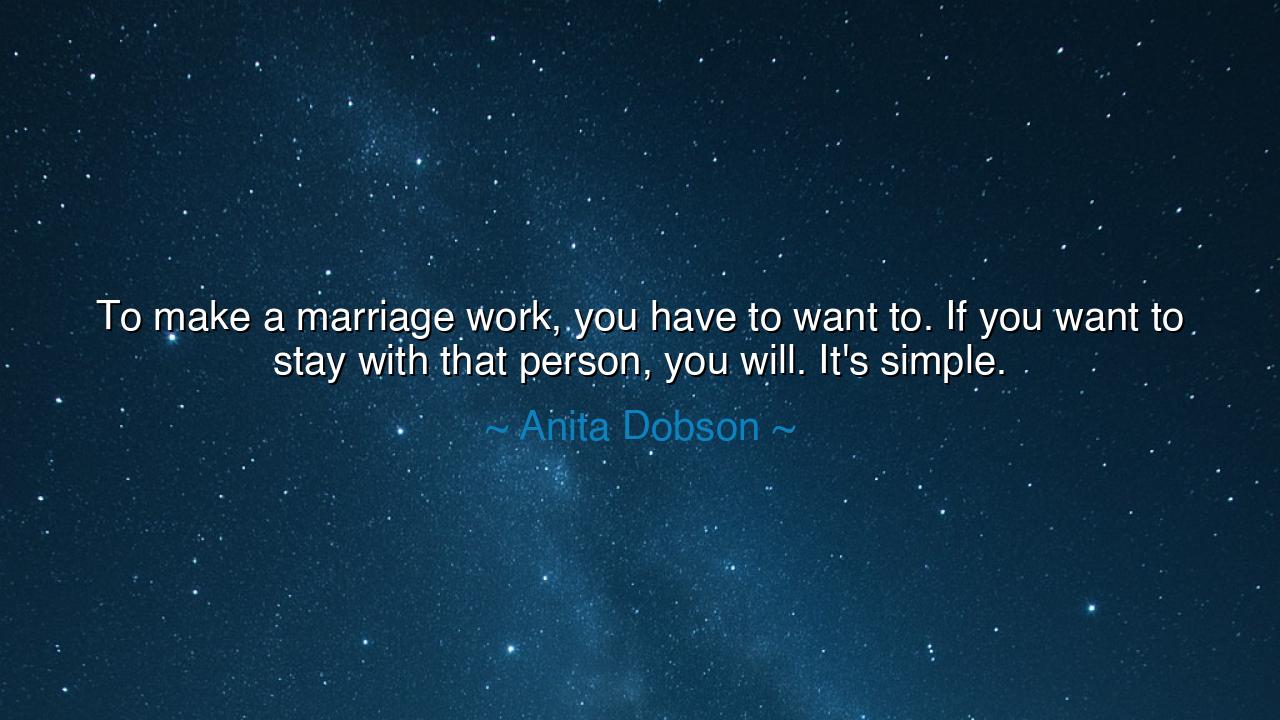
To make a marriage work, you have to want to. If you want to stay
To make a marriage work, you have to want to. If you want to stay with that person, you will. It's simple.






In the wise and tender words of Anita Dobson, we find a truth that has echoed through the ages: “To make a marriage work, you have to want to. If you want to stay with that person, you will. It’s simple.” Though the phrase seems humble and unadorned, it contains within it the timeless essence of human devotion. Dobson speaks not as a philosopher cloaked in abstraction, but as one who has lived the quiet heroism of love—a love not of fleeting fire, but of enduring flame. Her words remind us that commitment is not born from perfection, but from choice, and that the heart, once resolved, can overcome any storm.
The origin of this quote lies not in poetry or scripture, but in the lived wisdom of a woman who has known the world of art and the world of home. Anita Dobson, celebrated actress and wife of musician Brian May, has spoken often of the perseverance and faith required in long companionship. Her statement reflects the eternal truth that marriage, like any lasting bond, is not sustained by luck or circumstance—it is sustained by will. The ancients would have recognized this as an expression of intentio cordis, the intention of the heart. For even the gods, they said, cannot bind two souls who do not will to remain together.
From the earliest days of civilization, marriage was seen not only as a union of bodies, but of spirits—a sacred covenant of endurance. In the Greek tragedies, when love faltered, the downfall of families and kingdoms often followed. But when love endured—when the will to stay triumphed over passion’s exhaustion—it became a beacon of divine strength. To “want to” stay, as Dobson says, is the essence of such love: it is the daily act of choosing the same soul through changing seasons, when the first fire has cooled and what remains is the steady warmth of purpose.
Consider the story of Odysseus and Penelope, whose marriage endured the perils of time and distance. For twenty years, they were separated—he by war and wandering, she by loneliness and temptation. Yet both remained steadfast, not because their lives were easy, but because their hearts were firm in desire and decision. Every day, Penelope wove and unwove her tapestry to delay suitors; every day, Odysseus turned his face toward home. Their reunion was not a miracle—it was the fruit of will. They wanted to stay together, and so they did. As Dobson declares, the mystery of marriage is no mystery at all: the will to love is stronger than the world’s attempts to divide.
Yet in the modern age, many forget this simplicity. We live in a time that worships feeling above faithfulness, emotion above endurance. When love falters, we are told it is spent; when passion fades, we are told it has died. But Dobson’s wisdom cuts through the noise: love is not sustained by feeling, but by choosing. The ancients called this the virtue of constancy—the steadfastness of soul that refuses to yield to every gust of doubt. To “want to” love is to plant your heart like a tree in the soil of devotion, letting its roots deepen even when the winds rage.
The beauty of Dobson’s teaching is its humility. She does not romanticize struggle nor promise eternal bliss. She simply reminds us that what endures is what we tend. If you want to stay, you will find the way. It may require forgiveness, patience, sacrifice—but all of these flow from the original will to remain. Like the craftsman shaping his work, or the farmer tending his fields, love thrives under attention and withers under neglect. Desire is the seed; effort is the harvest.
The lesson, then, is clear and timeless: great love is not effortless—it is chosen, again and again. To make a marriage work, one must awaken each day and renew the vow within the heart: “I will stay. I will try. I will love.” The ancients called this the discipline of the soul—the daily strengthening of what is sacred through practice, not impulse. It is not the absence of hardship that makes a union holy, but the presence of will amid hardship.
So, to those who seek enduring love, let these words be your compass: care for the one you have chosen as if they were the whole world. When storms arise, remember that the decision to remain is not weakness—it is power. For love that endures is love that is chosen; and love that is chosen, again and again, becomes immortal. As Anita Dobson reminds us, it is simple—but in that simplicity lies the deepest truth of all: that the strength of any marriage, and indeed of any love, rests not on perfection, but on the steadfast, sacred will to stay.






AAdministratorAdministrator
Welcome, honored guests. Please leave a comment, we will respond soon